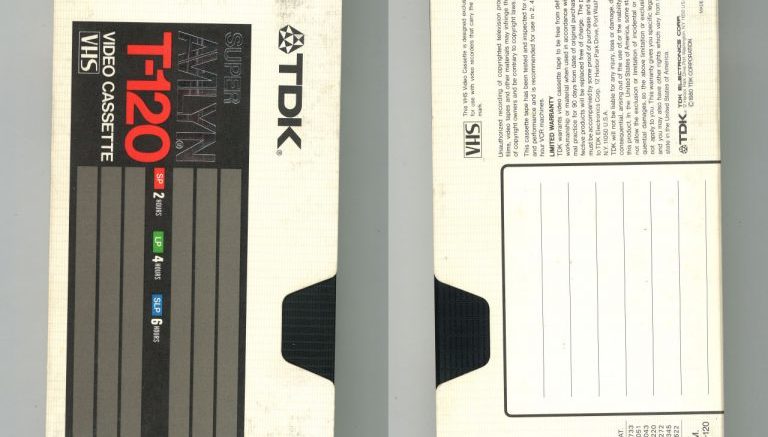If you haven’t picked up something like our AV-Grabber, it’s time. It’s really time. This cute little device will let you transfer any old standard definition content to digital form. Because, time is running out. Worst of all, we don’t know how fast it’s running out.
Why don’t VHS tapes last forever?
In order to understand the pickle we find ourselves in, we need to understand the nature of magnetic tape. Magnetic tape is made up of two things. First, there’s a backing, which is usually made of mylar or some other plastic that doesn’t stretch when it heats up. On top of that there’s a layer of magnetic particles suspended in a sort of emulsion.
Those particles can move when magnetized, but the gelatin-like stuff they are in keep them from moving back easily. So, when another magnet passes over them which is much less powerful, that magnet can detect the state of those particles.
Magnetic tape, at least as it was used for VHS tapes and cassettes, is an analog medium. In other words, the signal that comes in is stored more or less exactly on tape. It isn’t translated to digital form. When analog systems work, they work spectacularly. But, they are prone to losing their fidelity far more quickly than digital system.
Eventually, magnetic tape begins to wear out. The mylar backing could break. The emulsion could lift from the tape. Most commonly, the magnetic particles just drift over time back to a random state. This means the signal that they’ve encoded begins to break down. Given enough time, those particles just become so random that you don’t get any image at all.
How long does it take for VHS tapes to turn to “static?”
That’s a surprisingly hard question to answer. You would think that more expensive, pro-grade tapes would last longer. Sometimes they don’t. You would think that perhaps if the tape was only used once, it might last longer. That’s not necessarily true.
For better or worse, I’ve got a box of videotapes from the 20th century and over time, I dig into them. I’ve already transferred the things I really care about and I just poke through the rest searching for anything that might be interesting.
I keep these tapes in a room where it doesn’t get too hot or cold, and away from direct sunlight. That’s a good idea for anything you want to save.
As far as I can tell, most tapes are going to be good for about 15 years unless they haven’t been played over and over. This has been kind of a surprise to me, because at one point I was told tapes really only last 5-7 years. But when I started this process I had a lot of tapes that were close to 15 and they mostly transferred well.
I did find that if a tape had been used over and over again it broke down long before that 15-year boundary, though. There were some tapes that didn’t last even though they were “pro-grade” and very expensive at the time. Others, which I bought at the drugstore, held up well.
Don’t give up, but don’t have high expectations
I picked up a 35-year-old VHS tape and I was surprised to find it played fairly well. There was a little bit of distortion at the bottom of the screen but that was it. I mean, these tapes were never really great looking to begin with.
On the other hand, I also picked up a VHS copy of a few M*A*S*H episodes that I never watched even once. They were bought toward the end of the VHS era and I finally looked at them about 2015. There was literally nothing but static on them. Now, maybe they were like that when I got them. I’ll never know.
Time is definitely running out though
The first VHS tapes you’re likely to encounter come from the late 1970s, which means they are over 40 years old. The newest ones might be from 2005, by which time the tech was being replaced by DVD and DVRs. So, even the newest tapes have already reached the point where it’s a crapshoot at best. Now’s the time to be going through those old tapes and transferring them to your computer, while you can. Of course, you can shop at Solid Signal for everything you’ll need.





